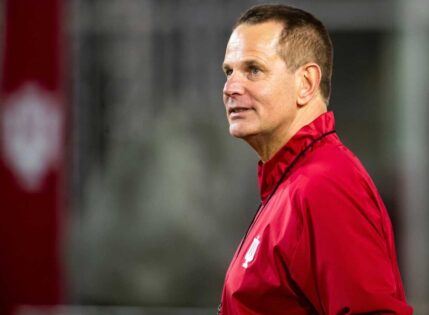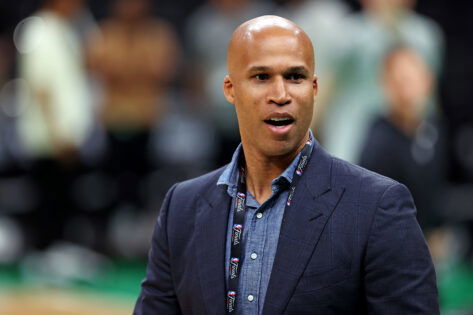Anxiety can manifest in many ways in human beings. For DP World Tour pro Chris Wood, it started with intense performance pressure and a deteriorating sense of self-efficacy in his game, especially when it came to his swing, which he says was in a “horrendous place” technically. Once feeling “completely humiliated” after losing 8 balls during a pro-am in India, Chris Wood told Bunkered, “What that did to me – the fear, the anxiety, the tension – it was just out of control.” But such is the human connection with anxiety that Chris Wood is not alone in his experience; many of his fellow pros have felt the same way.
Recently, having read Wood’s journey and struggle with his swings, drivers, and golf in general, PGA Tour pro Michael S. Kim took to social media to share his own story with his followers. “A process that I know all too well…” said Kim in his latest X post, “I know too many golfers who lost careers thru something similar. So great that Chris has started to get out of the darkness.”
Despite the consideration, however, Kim agrees that, “There’s a lot of talk about how drivers are sooo easy to hit these days (which is true in general) but the speed and the high launch low spin nudges golfers swings to go into a certain direction which can be really bad for some. With the driver, it’s more of a physical swing issue which evolves into a mental issue. I didn’t get going in the correct direction until my swing changed and then I was able to figure things out mentally.”
The one-time PGA Tour winner, Kim, has been pretty open about his struggle with golf. Last year, Kim confessed how pros he knew dealt with high-stress situations, saying, “As I’ve talked to many Ams, they always seem to think we have all the confidence in the world when we’re over a golf ball. There are times when we are confident, but more times than not pros are dealing with lots of nerves and anxiety.”
So, for pros like Kim and Wood, the trouble starts with the feeling that their mental health depends on their game. “My value and worth were directly tied to my game. Played good, felt good. Played bad, felt bad,” as three-time LPGA winner Chistina Kim shared in 2021 with ESPN. Once dealing with the immense guilt of not being able to perform her best, Kim dealt with years of disappointing golf course anxiety by almost committing suicide.
However, eventually, she reached out for help to deal with her “darkest depths” that “came in the spring of 2011.” At that time, when Kim made this heartfelt confession, she had already dealt with a decade of this crippling anxiety. And yet, nothing speaks more about her willpower than the fact that she plays golf to this day, having made three starts this season.
A process that I know all too well…
I know too many golfers who lost careers thru something similar. So great that Chris has started to get out of the darkness.
There’s a lot of talk about how drivers are sooo easy to hit these days (which is true in general) but the speed… https://t.co/qOZuPAbs6F
— Michael S. Kim (@Mike_kim714) July 27, 2025
But the pressure to perform doesn’t discriminate between pros and amateurs. Michael S. Kim knows this firsthand, having navigated his own share of disappointments. With empathy and understanding, he reaches out to others who are facing similar challenges. He did the same for an amateur, Theo Humphrey.
Early this month, amateur Theo Humphrey was playing at the 2025 Explore NB Open when a bout of anxiety affected his gameplay, so much so that he took almost two minutes to hit his tee shot. In comparison, his playing partner, Jake Scott, took less than 20 seconds. At that time, too, Michael S. Kim showed support to the struggling golfer and sympathetically said, “Poor kid. Going thru it mentally and physically there.”
And although it is completely impossible to get rid of anxiety during high stakes or even low stakes situations – we are human beings, after all – one pro, Rory McIlroy, takes a crack at it by imagining “the worst case scenario.”
Rory McIlroy deals with golf course anxiety in a very-McIlroy way
Only golfers can understand the anxiety that comes with this particular sport, and even fewer can understand the immense weight of pressure, expectation, and anxiety that Rory McIlroy went through in his almost 11-year-long search for his first Masters win.
Yet, when he finally clinched his first Augusta National win this year and faced the question of “how do you deal with your performance anxiety,” the explanation he made resonated with most of us – despite no such similar experience. “I say this all the time. It’s counterintuitive to a lot of people to do this, but I do,” McIlroy said. “If you’re trying to overcome anxiety or nerves around performance, I try to think about, well, what’s the worst that could happen? I’m not going to die on the golf course.”
Yet, it is undeniable that this approach allowed him to confront his fears directly, particularly the “first tee nerves” that had once hindered his performance. By visualizing potential setbacks, he could devise solutions and regain his composure. “I would struggle on the first tee, and so, I would say to myself, well, what’s the worst that could happen? You hit it in the trees. OK, then what do you do? You go up there, and you figure it out,” McIlroy said.
In essence, despite the cripling anxiety, we find ways to adapt, learning to live with anxiety rather than letting it define us. We discover moments of calm amidst the chaos, small victories that remind us of our strength.
The post 1x PGA Tour Winner Reminded of Dark Past Amid Fellow Pro’s Traumatic Life Story appeared first on EssentiallySports.



